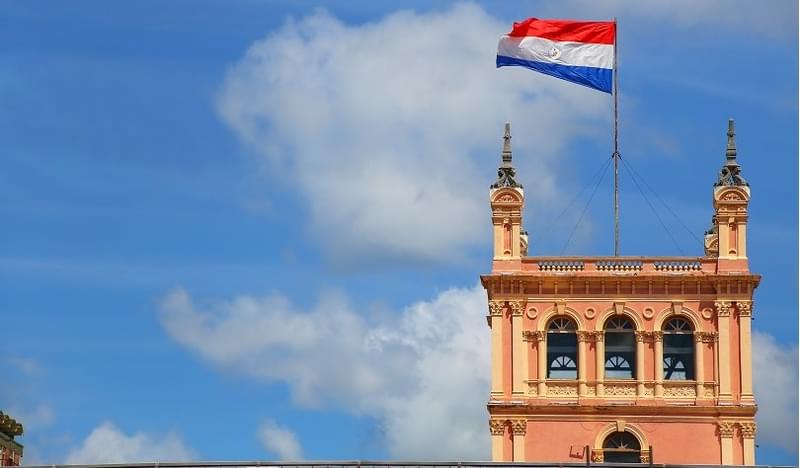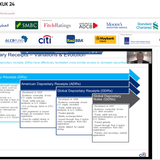From a servant of Argentinian and Brazilian state, Paraguay just ignited their "nationalism" saying loud and proud that they are not the "poor cousin" of Mercosur and they are going further: they want their place as leaders in the region.
When I first arrived in Asuncion my first words to John Biscomb, my boss at the time, were: "This is El Dorado," please allow me to explore this country. Since then, my relationships in Paraguay have improved and nowadays, we are recognised as a more-than-capable business partner for anyone interested in investing in Paraguay.
OUTLOOK
S&P’s credit rating for Paraguay stands at BB. Moody’s keeps the sovereign’s rating at Ba2. Positive dynamics in the economy are essential if we are to witness continued momentum in investment but, this in itself will not be enough if the country wants to see further ratings improvement. In our opinion, it will be necessary to overcome some deficits in legal and institutional security.
Still, one could say Paraguay has become the big brother of Argentina and Brazil, since it finally flexed its muscles and is currently leading the way with a rating higher than that of its neighbours.
The national economy, step-by-step, was showing that it is more solid than its peers and, in many respects, is already prepared to play in the big leagues, at least according to the three largest rating agencies of the world. S&P announced last week that it was downgrading the South American giant's note to "BB" again, with a "stable outlook" due to the delay in approving the fiscal adjustment and the pension reform.
This means that Paraguay moves to the front, since it maintains its "BB" ranking, one notch above Brazil and two above Argentina, which is currently rated "B +".
With this decision, Brazil moves further away from the seal of "good payer" and stagnates in the speculative category to sit three steps below investment grade, according to the classification of the US agency.
If the macro environment continues along its current path (providing a floor for investment) and the authorities continue taking steps in the institutional arena (as it seems they are doing), we could witness another jump in Gross Fixed Capital Formation.
Maybe the most important factor, however, is that a very balanced external environment makes Paraguay less vulnerable if global monetary conditions start to tighten (as it seems likely to), and other external shocks.
Paraguay recorded a Current Account surplus of 1.30% of the country's GDP in 2016. Current Account to GDP in Paraguay averaged -1.54% from 1980 until 2016, reaching an all-time high of 7.80% in 1990 and a record low of -11.60% in 1987. Admittedly, a much better position when compared with the -1.71% average seen in the 1980-2013 period.
Core consumer prices in Paraguay increased 3.90% in November of 2017 year on year, while core inflation in Paraguay averaged 7.51% from 1993 until 2017, reaching an all-time high of 21.79% in March of 1994 and a record low of 0.68% in November of 2004. This means a more stable currency, fixed income markets, and financial conditions.
The traditional banking system has grown in the last decade, as well as the local Stock Exchange, thanks to the macro-economic stability which has been a result of the Central Bank’s macroeconomic policy.
ROAD SHOW
In 2016, we made a road show, talking about Paraguay in Zurich, London and Dubai. We tried hard to secure the assistance of the Paraguayan State aboard, but we never got any kind of help. Bureaucracy is something to be solved in Paraguay, and it is not easy to break the ice and enter Paraguayan society – without help getting your foot in the door.
The results of the road show can be measured in investments: in total, about USD172mn flew to Paraguay in direct investment (mainly in agribusiness and cattle); we put together a consortium to participate in the "PPP - Rutas", that was cancelled later do doubts over how the State of Paraguay would guarantee the risks.
IDB MEETING 2017
At IDB meeting in 2017, we met over 40 delegations asking about opportunities in Paraguay. Even those who never before thought to look at the country asked for our support in the region, like EDC, KDB, the Singapore Sovereign Wealth Fund, and KSF. Whether they make a move in the future remains to be seen, but we offered what intelligence we could to help them in that decision.
We also helped some soya bean producers to re-structure their debts, using our capability to fund them with lower rates and negotiate with local banks better conditions.
BANKING SYSTEM
The financial system in Paraguay, is in my point of view, solid. Banks are making adjustments since 2015, when the soft commodities prices came to low levels and forced the system to review their credit control. Nowadays, the system is strong – not sophisticated, but it works.
The Banco Central de Paraguay needs to improve the ways they control the banks in 3 main ways: AML, Governance, and Basel I and II.
For the population in general, banks are expensive, and offer poor and often unreliable service. If you want an example: try to invest in a mutual fund in Paraguay, or try to open a dispute with your credit card. In the first case, there is no investment options, because the system is designed to issue only CDs; in the second case, banks in Paraguay are certain that credit card fraud is not a crime against the bank, and so do nothing for you.
HORACIO CARTES
Last fall, New York University sponsored a lecture entitled “Introducing Paraguay: A Land of Opportunity.” It was an offering that until recently might have produced shrugs of indifference, or snickering about the country’s tawdry history. Opportunities for whom? Dictators? Smugglers? Former Nazis? But there was the president of Paraguay, stepping to the lectern to deliver that speech as 150 students, professors, and distinguished guests applauded. A smiling and stocky 59-year-old with a helmet of bristly black hair, Horacio Cartes hailed his country’s transformation from corrupt Latin American backwater to untapped vein of economic promise, and chronicled his own move from businessman to head of state. “Armed with the values instilled in me by my parents, I started my political career, giving the country a new model of government, a new direction,” said Cartes, adding later, “Although much remains to be done, we are moving forward.”
I met Cartes several times in social meetings. I like his style. What he is doing for Paraguay is remarkable and he is a "salesman" in all senses of the word. He sees Paraguay as a company, and that’s a good thing in our view.
Cartes has shown a very pro investment policy, restructuring tax laws, the Public Private Partnership (PPP’s) bill, and fostering the application of the Maquila Law to international industrialists – creating a viable business climate for all investors worldwide, attracting the attention of many international financial institutions.
BRAZILIANS INVESTING IN PARAGUAY
Brazilians are starting to have second thoughts about business El Dorado next door. Low taxes, low wages and low overheads are driving the Paraguayan government’s ambition to become the "China of South America": a low-cost manufacturing hub that attracts investment from across the region.
As Brazil struggles through its worst recession on record, dozens of businesses have set up operations across the border, creating thousands of jobs. Broadly welcomed by the Brazilian government at first, the migration of investment is now facing increasing scrutiny as unemployment rises to unprecedented levels.
"It used to be a joke," said Murillo Onesti of Sao Paulo law firm OLN Advogados, referring to Paraguay’s past reputation in Brazil as a source of cheap knock-offs. "China faced the same resistance at first. But people are seeing now that you can produce better quality goods at a lower price."
In effect since 2000, Paraguay’s "maquila law" aims to replicate the success of Mexico’s maquiladora -- or manufacturing plant -- operations. Goods can be imported tax-free for assembly, then sold locally or exported with only the value-added part taxed at a rate of just 1%.
‘MADE IN PARAGUAY’
Since 2013, Brazilian companies have started to invest in earnest, encouraged initially by the vigorous salesmanship of Paraguayan President Horacio Cartes, and subsequently by the need to cut costs in Brazil’s dramatically deteriorating business environment.
"The crisis has helped," said Onesti, who offers legal and strategic advice to Brazilian businesses. "Executives are looking to reduce costs and increase productivity. Paraguay offers this solution."
Of the 126 businesses currently operating under the maquila law, 80 have opened since the start of Cartes’s mandate in August 2013, according to Paraguayan government figures. These companies have created over 11,000 jobs, with 6,700 coming in the last three years.
Around 80% of the foreign businesses set up under Paraguay’s maquila law are Brazilian-owned, according to Brazil’s National Industry Confederation, or CNI. Among the major firms that have recently set up operations across the border are fashion group Guararapes and toymaker Estrela.
It is not hard to see the attraction. According to the CNI, energy costs are over 60% lower in Paraguay while labour costs are 100% to 135% higher in Brazil. Added to that is the fact that Paraguay’s capital, Asuncion, is closer to Brazil’s industrial heartland of Sao Paulo than many of the country’s state capitals.
"Paraguay has the cost of China, with the transit time of Santa Catarina,” a state in southern Brazil, Flavio Rocha, CEO of Guararapes, told local media following his company’s decision to transfer some production from Fortaleza to Paraguay, in 2015.
BACKLASH
So far, the Brazilian government has embraced the trend. President Michel Temer visited Paraguay in early October in one of his first official trips abroad. On the occasion of his visit, Brazil’s ambassador in Asuncion, Jose Felicio, pointed out that Brazil’s USD1.6bn trade surplus showed that Paraguay’s economic development clearly benefits its larger neighbour.
But not everyone is so enthusiastic. Tasso Jereissati, a senator from the Social Democracy Party, known as the PSDB, has expressed concern that Paraguay’s tax breaks are luring away clothing and textile companies from under-developed parts of Brazil.
"Our companies are starting to migrate to Paraguay," he told Bloomberg in an interview on Friday. "It’s impossible for you to keep industries here when you compare the tax and labour advantages that Paraguay is offering."
In response to these concerns, Brazil’s Ministry of Industry, Trade and Services said in an e-mailed statement that it was "working on a strategy for Brazilian investments in Paraguay, but without incentivizing the migration of companies and jobs from Brazil to the neighbouring country."
With the Brazilian recovery still proving elusive, concern about Paraguay eating Brazil’s lunch are likely to grow, particularly if unemployment continues to rise. "This process is only just starting,"Jereissati said.









